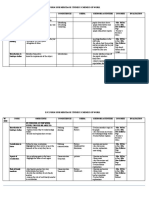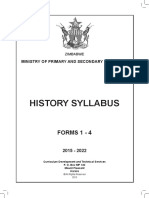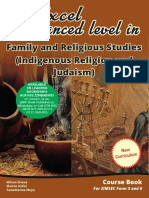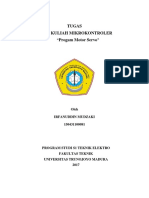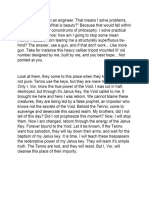Professional Documents
Culture Documents
O Level Literature Commentary Sample - Compressed
O Level Literature Commentary Sample - Compressed
Uploaded by
Brenda MakonoOriginal Description:
Original Title
Copyright
Available Formats
Share this document
Did you find this document useful?
Is this content inappropriate?
Report this DocumentCopyright:
Available Formats
O Level Literature Commentary Sample - Compressed
O Level Literature Commentary Sample - Compressed
Uploaded by
Brenda MakonoCopyright:
Available Formats
1
Understanding O level literature in English Study Pack
S. SITHOLE
DINGANI PUBLISHERS 00263 77 789 6159
ORDER YOUR STUDY PACKS TODAY 0292 - 27 02 89
About the publishing house
Dingani Publishers
Between 10th & 11th Avenue
Robert Mugabe, Bulawayo
Cover Designed by: Dingani Publishers
Typesetting by: Dingani Publishers
All rights reserved. No part of this book may be reproduced or utilized in
any form or by any means, electronic or mechanical, including
photocopying, recording or by an information storage and retrieval system,
without permission in writing from the Publisher. Inquiries should be
addressed to Dingani Publishers.
Printed by Dingani Publishers in Bulawayo, Zimbabwe
DINGANI PUBLISHERS 00263 77 789 6159
ORDER YOUR STUDY PACKS TODAY 0292 - 27 02 89
Inhalt
PAPER 1 ........................................................................................................ 6
TITLE OF THE BOOK: SHADOWS ON THE HORIZON ......................... 6
TITLE OF THE BOOK: I WILL WAIT ..................................................... 44
PAPER 2 ...................................................................................................... 76
TITLE OF THE BOOK: BLACK BOY ...................................................... 76
TITLE OF THE BOOK: OTHELLO ........................................................... 85
LORD OF THE FLIES: WILLIAM GOLDING ......................................... 93
DINGANI PUBLISHERS 00263 77 789 6159
ORDER YOUR STUDY PACKS TODAY 0292 - 27 02 89
PAPER 1
Section A: Shadows on the horizon
Section B: New voices diversity dawns
Section C: I will wait
PAPER 2
Section A: The valley of Tantalika
Black boy
Section B: Othello
Lord of the flies
DINGANI PUBLISHERS 00263 77 789 6159
ORDER YOUR STUDY PACKS TODAY 0292 - 27 02 89
PAPER 1
SECTION A
TITLE OF THE BOOK: SHADOWS ON THE HORIZON
AUTHOR: STEPHEN MPOFU
The village priest
Setting-Midlands, rural village
Background -post colonial, soon after independence
Third person narration
Summary
Tinoidziwa returns home in post-independence era. He visits his rural home where
his father Mandere tells him of recent events at the church village. The village
priest Kanana rejects the black choir and its instruments of cowhide drums and
banjos, in favour of Mrs Jones piano .He stated that the African traditional
instruments were not melodious enough to lift the hearts of people close to heaven
like the piano did.
The village choir angrily left the church. Thereafter the priest reject an old
woman’s offering of choice monkey nuts. The priest reprimanded the old woman
for bringing monkey nuts instead of money. He went on to say Jesus needed money
instead of nuts. The old lady was ridicules in front of the church .However
Mandere says he felt sorrier for the illiterate Africans laughing at the old woman
whilst holding bibles they can't read. He saw that the church failed to perceive that
the old woman acted out of true Christianity. After the story Tinoidziwa receives
a revelation that the church needs the people more than the people needs the
church.
Themes
Neo colonialism, religious hypocrisy, religious indoctrination, identity crisis,
cultural degradation and alienation, racial discrimination, cultural conflict (African
culture vs Western culture)
DINGANI PUBLISHERS 00263 77 789 6159
ORDER YOUR STUDY PACKS TODAY 0292 - 27 02 89
CHARACTERIZATION
Kanana-The Village priest
Westernized colonial product-He trained overseas and he wanted to
maintain the western ways of worship.
Suffers from identity crisis-fails to identify with African forms of worship
when he himself is African. Rather he is an African who related to the
western culture.
Hypocrite -Mandere describes Kanana as "pretending to be a devout
Christian."
Snobbish -looks down upon the old woman's offering of monkey nuts in
preference of money.
Mandere
Perceptive -sees through the hypocrisy of the priest.
Wise-he pities the ignorant blacks over the old woman who displayed the
virtues of Christianity
Philosophic -he keeps his son engaged in the story till his son picks a lesson
from it all
Style of writing
Biblical allusion, dialogue, rhetorical questions, third person narration
Symbolism
Western African
piano Cowhide drums and banjo
Kanana Old woman
Mrs Jones Village choir
Money offering Monkey nuts offering
DINGANI PUBLISHERS 00263 77 789 6159
ORDER YOUR STUDY PACKS TODAY 0292 - 27 02 89
Hunters of fortune
Setting - urban industrial setting
Summary
The story is about Jimi a company executive who is in illicit dealing with one
Mavhiri. Mavhiri is expected to ferry out illegal parcels. However at this time
Mavhiri is hesitant as he has heard talk that there are complaints of corrupt
leadership in the company. Jimi forces Mavhiri to accept the merchandize so they
can both make some money. Mavhiri attempts to argue with him but he fails to
arrive Jimi to let go of the deal. In the end Mavhiri reveals his true identity that he
is an undercover detective and places Jimi under arrest.
Themes
Corruption, betrayal, greed, exploitation, abuse of authority, deception, smuggling
of precious minerals, bribery, vice vs virtue.
Jimi
Wealthy – his black Mercedes is a symbol of wealth and high status, typical
of black leadership in post-colonial era.
Forceful – he tries by all means to force Mavhiri to deliver the package the
reader is led to assume that the groundnut is a diamond.
Corrupt – Jimi orchestrates diamond smuggling using Mavhiri as a courier.
He boast of illegally benefiting from the country’s wealth.
Greedy – he believes it is his right to eat Zimbabwe
Manipulative – he forces Mavhiri to continue smuggling because he did
him a big favor by him a job in the company.
Disillusioned – his illusion that Mavhiri was his underdog is shattered
when he discovers that he is a detective.
Mavhiri
Underdog courier – he is tasked with the act of smuggling a diamond. Jimi
imposes his task on Mavhiri
Cautious – he finds the task at hand difficult because there is talk about
corrupt leadership to which they have direct involvement.
23
DINGANI PUBLISHERS 00263 77 789 6159
ORDER YOUR STUDY PACKS TODAY 0292 - 27 02 89
Morally conscious – his analogies show that he is no longer interested in
pursuing criminal activities of smuggling minerals.
Resistant – he continually resists the task Jimi is forcing him to perform
‘this is a very difficult task sir, I have already said it’
Law enforcer – eventually he arrest Jimi and turns him in for questioning
bringing an end to Jimis corruption.
Significance of the story
The tittle ‘hunters of fortune’ attacks self-serving attitudes of the elite in
post-colonial Zimbabwe.
‘Hunters of fortune’ are capitalist who sought to enrich themselves using
the country’s resource which are the spoils meant for all citizens.
The authors shows the need for a justice system that seeks to restore the
nation’s legacy by eliminating.
Style of writing
Visual imagery – chains maker with a big pot belly, broad shoulders, and
small effective to show a life of excels
Symbolism – ‘gleaming black Mercedes’, it represents wealth and power.
The car shows Jimi’s influence.
Dialogue – it is used to expose inter personal conflict between Jimi and
Mavhiri
Proverb – ‘make hay while the sun is still shining’- Jimi’s emotional
blackmail to persuade Mavhiri to continue participating in diamond
smuggling.
Metaphor – ‘groundnut’ -sly name for the diamond to be smuggled
Simile – ‘it is like a king journey up a mountain’ Jimis response to the risk
of being caught he considers it part of the scheme of smuggling
Analogy – the use of browsing even, diverting from the furious and the
farmer who complains of undisciplined cattle that need to be unspanned
and represent the moral debate between good and evil.
24
DINGANI PUBLISHERS 00263 77 789 6159
ORDER YOUR STUDY PACKS TODAY 0292 - 27 02 89
The author passes a message of the need for selflessness and tolerance in
marriages. Dendera almost made a fatal mistake of destroying the child he
desired so badly because of his selfish attitude towards Sarah.
PRACTICE QUESTIONS
The village priest
1. Describe the character of the village priest Kanana (25)
2. What aspects of village life are revealed in the story (25)
3. How are feelings of anger stirred in the story (25)
The Black pot
1. How is a tense atmosphere created in the plot ?(25)
2. Discuss the effect of a child narrator in the story (25)
3. What lessons are drawn from the story (25)
Midnight operation
1. What aspects of colonial lifestyle are revealed in the story (25)
2. Examine the author’s treatment of race in the plot(25)
3. Comment on the presentation of the narrator
Nyamandu
1. Discuss the challenges faced by guerillas and their collaborators during thr
struggle for liberation (25)
2. What feelings are evoked as you read the story (25)
3. Give an account of the attack on Nyamandu’s shop (25)
Bruised on Both sides
1. Examine how the title is fulfilled in the story (25)
2. List the atrocities of war revealed in the passage (15)
3. Discuss the various forms of conflict revealed in the story (25)
The Criminals
1. Examine the thematic concern of justice in the story (25)
2. Identify the various levels of betrayal presented in the story (25)
42
DINGANI PUBLISHERS 00263 77 789 6159
ORDER YOUR STUDY PACKS TODAY 0292 - 27 02 89
TITLE OF THE BOOK: I WILL WAIT
AUTHOR: BERTHA MUSORA
Summary
Act 1 scene1
Nyasha took position seventeen in a class of forty-two and desires to be a in the
semi-rural setting of Atete Rutendo’s home, Rudo and Atete Rutendo await the
arrival of Leo James Chizema Rudo’s boyfriend. They briefly converse about Leo
James, Atete Rutendo is inquisitive about James. Rudo’s responses reveal that Leo
James is from Wedza, he is a lawyer earning a fair salary. Rudo tells Atete that she
feels true love for Leo James. Atete states that in marrying for love is out of
fashion, that it is more lucrative to marry for money. She also states that long back
they married to fulfil a social need. Rudo tells her aunt that she had a dream of
Togara seated at her left, Tambudzayi opposite her and her children on her right.
They were having a meal, however before they had finished Tambudzayi had
disappeared leaving Rudo with her family. Atete Rutendo interprets the dream that
Tambudzayi wants Rudo to join the family she left behind. Rudo rejects this and
states that she does not love her brother-in-law and that she loves Leo.
Atete Rutendo tells her that the words of a dead person need serious consideration,
she also informs her that Togara has been responsible for her welfare since
Tambudzayi passed away. Rudo is surprised as she thought her father was
responsible. Rudo reveals that Leo intends to marry her in five years’ time when
she has completed her degree. Atete reveals that Togara has not yet shown interest
in marrying her yet and tells her that she can proceed with her education. Rudo
reveals that her results are coming out in six weeks’ time. Rudo hurries out at the
sound of the bus and Atete Rutendo drops the peanut container. As Atete Rutendo
begins to collect the peanuts from the floor Togara arrives, he receives a warm
welcome. He notices peanuts all over the floor and Aunt Rutendo explains how
she accidentally dropped them. She also boasts that she reaped six bags of peanuts
which made her a lot of money. The two joke about how the word money maker
is used. They also joke about hoe the word Terylene was also used to suit people’s
purposes.
They both laugh heartily. Atete offers Togara seat and they exchange traditional
greetings of dropping hands. Atete confirms Togara that she had not been well and
44
DINGANI PUBLISHERS 00263 77 789 6159
ORDER YOUR STUDY PACKS TODAY 0292 - 27 02 89
that she only got better after consulting n’anga and receiving his treatment. Her
inquiries about Ruvimbo and Nyasha. Togara informs her that Ruvimbo is top of
her class and she wants to be a radiographer bus driver. Atete Rutendo comments
that in her day it was the teachers who earned top salaries and she ask if Ruvimbo
will earn as much. She is pleased that when Nyasha becomes a bus driver he will
drive her around.
Togara composes himself and announces that he and his people are ready for Rudo
to come and join the family as his wife. He feels she is mature enough to take on
the role of mother and wife in a month’s time. Atete Rutendo asks if Rudo is old
enough at seventeen. She asks if Togara can give Rudo two, three of four more
years, for her education. Togara refuses stating that he has psychological, social
and physical needs. He insists he has a loving and financially stable home waiting
for her. Atete Rutendo states that she will inform Rudo’s father. As he leaves Atete
states that if there was time, she would have prepared the children’s peanut butter.
As Togara exits he states that it should be ready in his next visit. Atete Rutendo
continues to pick up peanuts from the floor and hears a car pulling up. Rudo enter
with Leo. They receive a warm welcome Atete appreciates the benefits of having
a car. Rudo officially introduces her boyfriend to Atete Rutendo. He is shy, third
child in a family of six.
Atete Rutendo is informed that his totem is Soko, Moyondizvo. She is also told
that he is from Wedza and that his mother is at home and his father is working at
Bulawayo. Atete Rutendo keeps forgetting his name. Rudo says she can call him
Lei James, or Lee or Leo or James or Jimmy or L or Jay or LJ. She is very excited
about her aunt meeting her boyfriend. Lei tells Atete Rutendo the story behind his
name. She is also informed that Leo James is a lawyer. Atete Rutendo is concerned
about whether his salary measures up to a teacher’s salary. Leo James states that
he wishes to marry Rudo in three or 4 years to come, he states that he is travelling
abroad in a month for a six-month course and he wishes to give Rudo a ring as a
promise to marry. Atete Rutendo doesn’t understand the concept of an engagement
and states that in their time they exchanged articles of clothing. Rudo insists Atete
Rutendo handles the engagement arrangements as Leo James leaves in a month.
Leo James would be coming in a weak for a reply he had to leave promptly due to
a business meeting later that afternoon.
Atete Rutendo exclaims that he works on Saturday’s evenings unlike teachers who
worked till Friday afternoon. She tells them that she will go to Rudo’s father in
45
DINGANI PUBLISHERS 00263 77 789 6159
ORDER YOUR STUDY PACKS TODAY 0292 - 27 02 89
two days to present their case. Leo is told that Rudo’s father stays 25km away and
the bus fare is forty-five cents. Atete promises to keep them informed.
Rudo is denied a request to accompany Leo to Harare. Atete Rutendo breaks the
news that she is in a dilemma. She informs Rudo that Togara wants her to join his
family as his wife in a month. Rudo bursts out crying that she doesn’t love Togara
and that she loves Leo. Atete sympathizes with Rudo and states that both of them
are the same however Rudo has to follow her sister’s instructions. Rudo continues
to cry and begs Atete Rutendo to do something
CHARACTER PRESENTATION
Rudo
Idealistic – she believes in true love she says to Atete Rutendo’ you may
call it puppy love but I am seeing true love. She also believes that she
has seen true love.
Rebellious –despite her dream she chooses to defy Tambudzai’s dying
wish (flippantly) defy that I am aware of what said of course
Disillusioned-she discovers that it is Togara and not her father who has
been taking care of her clothing and education.
Ambitious- she wishes to continue with her education to study for a
degree and get married to the love of her life Leo James
Child bride- she is promised for engagement to Togara at a tender age as
a fulfilment to her sisters dying wish.
Amicable- she has an easy relationship with Atete Rutendo.she is also on
good terms with Leo James and builds a good rapport between the two by
her easy dialogue
Atete Rutendo
Old fashioned- she states that commitment is shown by exchanging
clothes she didn’t understand the engagement rings concept
Materialistic-she measures financial well-being by a teacher’s salary
during her time teachers were top earners.
46
DINGANI PUBLISHERS 00263 77 789 6159
ORDER YOUR STUDY PACKS TODAY 0292 - 27 02 89
Act 3 Scene 1
Setting: Atete Rutendo’s house
Summary
While picking a thorn from her palm Atete Rutendo hears the sound of a car. Leo
James enters and Atete Rutendo asks him why he is back so soon. Leo James tells
her that he couldn’t stay abroad because he was bored and lonely. He tells her that
he arrived yesterday and he was expecting to see Rudo as he told her about his
coming. Atete tells him that Rudo is probably unaware of his coming as she is at
Masvingo taking care of her aunt’s children, as the aunt is in hospital.
Leo James says he might be unable to function as he resumes work without taking
a glimpse of her. He asks if they can drive there. Atete refuses under the pretext
that she will be preaching that Sunday hence the need for the preparations. As Leo
James insists to drive there Atete Rutendo asks him about his experiences abroad.
Leo unswayed still insists on driving to Rudo. In the end Atete Rutendo tells Leo
James that he should give her a week, he will find Rudo at her place. Leo however
wants to see her in hours such that Atete asks if Leo James was trying to convince
her of his love for Rudo. Leo tells her that he is either a pretender or a flatterer but
he cannot help feeling the way he does for Rudo. He apologises for bothering Atete
Rutendo but insists that he must see Rudo. Atete tells Leo James to come back
Sunday as she will rush to Masvingo to fetch her. Leo James asks about her Sunday
service, Atete replies that someone else can take her place besides she hopes to be
back by then. Leo James reminds Atete that he had offered to drive her to
Masvingo, Atete Rutendo reiterates her promise that he will find Rudo present on
Sunday. Seeing that he didn’t have much of a choice Leo James gives Atete
Rutendo a ten dollar note for the bus fare, he tells Atete Rutendo to expect him
Sunday morning and wishes her a safe journey. The scene concludes with Atete
Rutendo deep in thought.
Themes
Deception, love, interpersonal conflict, intra personal conflict
65
DINGANI PUBLISHERS 00263 77 789 6159
ORDER YOUR STUDY PACKS TODAY 0292 - 27 02 89
PAPER 2
SECTION A
TITLE OF THE BOOK: BLACK BOY
AUTHOR: RICHARD WRIGHT
Narrator
Black Boy is narrated by the author, Richard Wright, and tells the story of his life
from early childhood to about age twenty-nine.
Point Of View
As the text is written as a stylized memoir, the narrator always speaks in the first
person. Although he occasionally speculates as to what another character thinks or
feels, those speculations are always conditioned by the fact that the narrator is a
real historical figure with limited knowledge.
Tone - Confessional, ironic, philosophical
Tense - Past
Setting (Time) - Roughly 1912–1937
Setting (Place)
Primarily Jackson, Mississippi; West Helena and Elaine, Arkansas; Memphis,
Tennessee; and Chicago, Illinois, with detours to rural areas in the Deep South and
to New York City
Protagonist - Richard Wright, the author and narrator
Major Conflict
Richard demonstrates inborn individualism and intelligence, traits that can only
cause problems for a black man in the Jim Crow South; he struggles with blacks
and whites alike for acceptance and humane treatment; he struggles with his own
stubborn nature.
76
DINGANI PUBLISHERS 00263 77 789 6159
ORDER YOUR STUDY PACKS TODAY 0292 - 27 02 89
Rising Action
Ella (the schoolteacher) tells Richard the story of Bluebeard and His Seven Wives;
Richard writes his story “The Voodoo of Hell’s Half-Acre”; Richard graduates
from public school and enters the workforce only to be terrorized by the actions of
racist whites.
Climax
Richard reads H. L. Mencken’s A Book of Prefaces and becomes obsessed with
reading and writing; Richard permanently flees the South; he makes his way to
Chicago, where he can live a more dignified life and more fully exercise his
ambition to become a writer.
Falling Action
Richard comes to understand the psychic pain of growing up black in America and
realizes his duty to record his experiences and his environment through writing; he
enters the Communist Party and W.P.A. programs, coming into contact with
serious writers and outlets for writing about his ideals; he is ousted from the Party
but comes to a new vision of himself as an artist
Themes - The insidious effects of racism; the individual versus society; the
redemptive power of art
Motifs - Hunger; reading; violence
Symbols - Ella’s infirmity; the Memphis optical shop
Foreshadowing
Perhaps the sharpest foreshadowing in the novel is the activity of Comrade Young
in the Communist Party. The fact that a madman participates in the workings of
the Party without being detected suggests that the Party is fallible. Another
example is Richard’s relationship with his family, a relationship that foreshadows
how his personality will conflict with white authority.
Characters
Author, narrator, and protagonist of Black Boy. Richard is an unpredictable bundle
of contradictions: he is timid yet assured, tough yet compassionate, enormously
intelligent yet ultimately modest. Passive-aggressive as a young boy, Richard
either says very little or becomes melodramatic and says too much. Growing up in
77
DINGANI PUBLISHERS 00263 77 789 6159
ORDER YOUR STUDY PACKS TODAY 0292 - 27 02 89
SECTION B
TITLE OF THE BOOK: OTHELLO
AUTHOR: WILLIAM SHAKESPEARE
Summary
Othello is the story of a noble military general who has enjoyed many successes
on the battlefield, but because of mistakes of judgment and his outsider status in
his society, sabotages his most intimate relationship and himself. The play begins
on the grand scale of a military romance unfolding on the Mediterranean Sea.
However, the action of the drama shrinks to the claustrophobic ending in the
cramped bedroom where Othello kills himself after smothering his innocent wife.
The play moves from vast exteriors that provide a backdrop for Othello’s heroism
to interior spaces that offer—both literally and figuratively—no room to breathe.
The play’s constricting trajectory suggests that negative emotions like jealousy put
an emotional chokehold on a person, strangling their ability to think clearly and
thus preventing them from acting reasonably. It also contrasts the arenas in which
Othello is confident and powerful, such as the exterior world of battle, with the
domestic spaces in which he is less secure, and able to be easily manipulated.
The incident that sets the protagonist and antagonist on a collision course occurs
before the play begins, when Othello chooses Cassio as lieutenant. In being passed
over for promotion, Iago feels cast aside and left to fill the role of “ancient” (i.e.,
ensign), a military position that ranks at the very bottom of all commissioned
officers. Though angry with Othello’s choice, Iago feels equally upset that the
coveted job went to Cassio, who Iago considers less qualified than he is. He also
later reveals that he believes Cassio might have slept with his wife (in addition to
suspecting Othello slept with her): “For I fear Cassio with my night-cap too.” Iago
feels doubly degraded: a promotion he believes was rightfully his went to another
man, and both men responsible for the slight – Othello and Cassio – may be
sleeping with his wife. At this point, the audience’s sympathies are aligned with
Iago, as we haven’t yet seen Othello, and Iago does have just cause for his
grievances.
The tension of the play rises once the audience meets Othello and realizes how
disastrous Iago’s plan will be. Othello and Desdemona’s declarations of love for
85
DINGANI PUBLISHERS 00263 77 789 6159
ORDER YOUR STUDY PACKS TODAY 0292 - 27 02 89
each other, and Desdemona’s willingness to be disowned by her father in order to
be with Othello, raise the stakes for the couple, and shifts the audience to Othello’s
side. By contrasting Othello, Desdemona, and Cassio’s virtuous natures with
Iago’s lies, the play heightens the tension between the truth and deception. With
everyone in the play subject to Iago’s scheming, the audience becomes his silent
co-conspirator as he unveils his plans in a series of asides. As Iago easily succeeds
in his plot to get Cassio drunk, incite him to fight Roderigo, and convince Othello
to fire him – all the while acting as though he loves Cassio – we see what a skilled
manipulator he is. Iago’s scheming, cynical nature is starkly contrasted with the
rest of the characters in the play, who are all undone by their own trusting, honest
natures and their inability to see through Iago’s deceptions.
The conflicting forces of good, as represented by Othello, and evil, as represented
by Iago, come into direct contact at the end of Act III, scene iii, when Othello
kneels with Iago and pledges his unswerving desire to take revenge on those who
have cuckolded him. Unlike many Shakespearean tragedies where the protagonist
confronts the antagonist at the play’s climax, Othello expresses his absolute trust
in Iago by appointing him his new lieutenant. Othello’s misplacement of trust, and
blindness to Iago’s true motivations, increases the tension further, as the audience
wonders when, if ever, Othello will see the truth about his supposed friend. As
Othello becomes increasingly deranged with jealousy, and refuses to listen to
Desdemona’s protestations of her innocence, he becomes less a protagonist, and
starts to figure more as a second antagonist, acting in league with Iago. From this
point on, no matter what Desdemona does, it only proves her guilt in Othello’s
eyes.
In the play’s remaining two acts, Iago’s treacherous plot unfolds with a brutal
inevitability. Othello shifts from believing Desdemona could never betray him, to
demanding proof of her infidelity so he can feel justified in killing her. When Iago
suggests Othello strangle Desdemona in the bed in which she was allegedly
unfaithful, Othello says “Good, good, the justice of it pleases!”. Othello still loves
his wife passionately, but rather than considering her virtues as arguments against
Iago’s accusations, instead sees them as reasons to be all the more upset by her
alleged infidelity: “O Iago, the pity of it, Iago!”. Deranged with jealousy, Othello
conspires with Iago to murder Cassio and devises his plan to kill Desdemona.
Either his wife has been unfaithful and is lying to him, or his beloved, “honest”
friend Iago has been lying to him. Only after he kills Desdemona does Othello
86
DINGANI PUBLISHERS 00263 77 789 6159
ORDER YOUR STUDY PACKS TODAY 0292 - 27 02 89
discover he believed the wrong person. When he at last realizes his error, he kills
himself, rather than live in a world where honour and honesty have no value.
CHAPTER SUMMARY
Act I
Before Othello begins, Roderigo has been pursuing Desdemona, a Venetian
noblewoman. One night, he hears from his soldier friend, Iago, that Desdemona
has secretly married his General, the Moorish Othello. Iago bears a grudge against
Othello for overlooking Iago for a lieutenant position. Instead, Othello chose
Michael Cassio, leaving Iago only at the low rank of ensign. Iago urges Roderigo
to continue his pursuit of Desdemona. He knows Senator Brabantio, Desdemona's
father, will dislike having Othello as a son-in-law. So late at night, Iago and
Roderigo wake Brabantio and tell him the news of Desdemona. Brabantio angrily
summons the militia to arrest Othello. At that moment, officers arrive to summon
Brabantio to an urgent meeting of the Senate. The Senate is concerned about the
imminent threat of a Turkish invasion fleet on Cyprus. Full of fury, Brabantio goes
to the council.
Othello Royal Shakespeare Company, 1999. A black Othello wears an
embroidered jacket and a brown gown with broad black and thin white stripes. He
stand with his right arm across his body, gesturing rejection; his expression is
disdainful. Royal Shakespeare Company, 1999
Brabantio interrupts the council, claiming vengeance against Othello. Othello is
already there because he has just been put in command of the forces to repel the
Turks. Othello explains how his stories of military prowess have helped him earn
Desdemona's love (good storytelling is the most important trait in a companion,
after all). Afterwards, Desdemona is called to reinforce the tale and defend her
marriage. Following Desdemona's defence, her father disowns her, and she
chooses to go with Othello on his campaign. She plans to travel in the care of
Lieutenant Cassio and with Emilia, Iago's wife.
Act II
In Cyprus, Montano, the governor of Cyprus, and his soldiers greet Cassio, Iago,
Desdemona, and Emilia as they disembark. Othello soon arrives with news that
87
DINGANI PUBLISHERS 00263 77 789 6159
ORDER YOUR STUDY PACKS TODAY 0292 - 27 02 89
LORD OF THE FLIES: WILLIAM GOLDING
Plot Overview
Summary
This is a story about a group of schoolboys from Britain whose plane is shot down
over an uninhabited tropical island.
Two of the boys, Ralph and Piggy, discover a conch shell on the beach, and Piggy
realizes it could be used as a horn to summon the other boys. Once gathered, the
boys set about electing a leader and creating a way to be rescued. They choose
Ralph as their leader, and Ralph appoints another boy, Jack, to be in charge of the
boys who will hunt food for the entire group. Ralph, Jack, and another boy, Simon,
set off on an expedition to explore the island. When they return, Ralph declares
that they must light a signal fire to attract the attention of passing ships. The boys
succeed in igniting some dead wood by focusing sunlight through the lenses of
Piggy’s eyeglasses. However, the boys pay more attention to playing than to
monitoring the fire, and the flames quickly engulf the forest.
One of the youngest boys in the group disappears, presumably having burned to
death. At first, the boys enjoy their life without grown-ups and spend much of their
time splashing in the water and playing games. Ralph, however, complains that
they should be maintaining the signal fire and building huts for shelter. The hunters
fail in their attempt to catch a wild pig, but their leader, Jack, becomes increasingly
obsessed with the act of hunting. Piggy criticizes Jack for causing the neglect of
the rescue fire, who hits Piggy across the face. Ralph blows the conch shell and
rebukes the boys in a speech intended to restore order. It emerges that the littlest
boys, known as “littluns,” have been troubled by nightmares from the beginning,
and more and more boys now believe that there is some sort of beast or monster
lurking on the island.
The older boys try to convince the others at the meeting to think rationally, asking
where such a monster could possibly hide during the daytime. One of the littluns
suggests that it hides in the sea—a proposition that terrifies the entire group. Not
long after the meeting, some military planes engage in a battle high above the
island. The boys, asleep below, do not notice the flashing lights and explosions in
the clouds. A parachutist drifts to earth on the signal-fire mountain, dead. Sam and
Eric, the twins responsible for watching the fire at night, are asleep and do not see
93
DINGANI PUBLISHERS 00263 77 789 6159
ORDER YOUR STUDY PACKS TODAY 0292 - 27 02 89
General essay questions
Discuss the various conflicts that are dramatized in Lord of Flies.
After reading Lord of the Flies, a critic remarked: “Human beings are naturally
evil”. By closely referring to the text, show that this statement is true.
Compare and contrast Ralph and Jack’s leadership qualities. Who in your view is
a better leader?
What lessons do you learn from reading the novel Lord of the Flies?
Give an account of Simon’s secret visits into the jungle up to the time he dies.
Explore the symbolism in Lord of the Flies.
Comment on the role and significance of Piggy in Lord of the Flies.
Imagine that you are Piggy a few moments before you die. Write a letter to your
aunt telling her about your experiences on the island.
What aspects of human behaviour are criticized in Lord of the Flies?
Discuss the theme of friendship and how it is brought out in Lord of the Flies.
108
DINGANI PUBLISHERS 00263 77 789 6159
ORDER YOUR STUDY PACKS TODAY 0292 - 27 02 89
You might also like
- Every Stone That Turns An AnalysisDocument16 pagesEvery Stone That Turns An AnalysisThandiwe marerwa94% (34)
- Shona Cala SampleDocument44 pagesShona Cala Sampleaddy100% (2)
- ZJC History Notes Form 1 and 2Document154 pagesZJC History Notes Form 1 and 2MUNUNURI TUMBARE90% (20)
- 2021 FRS O Level Notes 4047 P2Document24 pages2021 FRS O Level Notes 4047 P2BaSash Chiwara100% (3)
- I Will Wait NotesDocument25 pagesI Will Wait NotesNokutenda manyere100% (4)
- Excel Advanced Level Christianity & IslamDocument45 pagesExcel Advanced Level Christianity & IslamTrust Muchuchu100% (2)
- Lower Six FRS Students Notes-1-1Document149 pagesLower Six FRS Students Notes-1-1Mitch Shurx Kulinji80% (5)
- Shona Peqs and AnswersDocument92 pagesShona Peqs and Answershenry vambeya0% (1)
- Coming of The Dry Season CommentaryDocument2 pagesComing of The Dry Season Commentarysharon100% (1)
- Every Stone That Turns by BlezoeDocument15 pagesEvery Stone That Turns by BlezoeBradley Jonga100% (5)
- Shona Mutauro F4 SampleDocument47 pagesShona Mutauro F4 SampleMachisa PersuadeNoch keine Bewertungen
- Heritage Studies Form 1 Scheme-1-1Document7 pagesHeritage Studies Form 1 Scheme-1-1Clinton Chikengezha100% (2)
- Frs A Level Book Sample Maregedze Muronzi 2018Document47 pagesFrs A Level Book Sample Maregedze Muronzi 2018Mollyn Nhira100% (1)
- HERITAGE STUDIES NotesDocument23 pagesHERITAGE STUDIES NotesFegason Fegy92% (53)
- Zimbabwe School Examinations Council Mathematics 4004/2Document12 pagesZimbabwe School Examinations Council Mathematics 4004/2Tawananyasha Mukoriwo100% (8)
- FRS Form 4 - 2021Document17 pagesFRS Form 4 - 2021Lilly T100% (1)
- A Level Paper 2 Shona Past Exam QuestionsDocument27 pagesA Level Paper 2 Shona Past Exam QuestionsTanaka Mukupe83% (6)
- Mipanda Yemazita (Noun Classes) : Mupanda 1Document33 pagesMipanda Yemazita (Noun Classes) : Mupanda 1Tboi Tboi100% (14)
- ZIMSEC O Level English 2020Document12 pagesZIMSEC O Level English 2020Emilio Tumbe75% (4)
- 2021 FRS O Level Notes 4047 P1Document50 pages2021 FRS O Level Notes 4047 P1chenu sumaniNoch keine Bewertungen
- Yeukai A Level DigitalDocument51 pagesYeukai A Level DigitalWesley Trusere67% (6)
- History Cala A Level Changamire 2021Document2 pagesHistory Cala A Level Changamire 2021Clifford Zharare0% (1)
- English Notes Final ZimsecDocument14 pagesEnglish Notes Final ZimsecZvikomborero W Dube50% (2)
- ZJC History NotesDocument89 pagesZJC History NotesAngelica MakAngel92% (12)
- Heritage Notes Form 3-4-1-1Document170 pagesHeritage Notes Form 3-4-1-1Clinton Chikengezha83% (6)
- Heritage Multiple ChoiceDocument8 pagesHeritage Multiple ChoiceAndile67% (9)
- Heritage Studies PDFDocument8 pagesHeritage Studies PDFAndile92% (12)
- Zimbabwe School Examinations Council Family and Religious Studies 4047/2Document2 pagesZimbabwe School Examinations Council Family and Religious Studies 4047/2Parasmento100% (15)
- Zimbabwe School Examinations Council: Additional Materials: Answer PaperDocument8 pagesZimbabwe School Examinations Council: Additional Materials: Answer PaperMutsa Matimbe100% (1)
- Shona Green BookDocument38 pagesShona Green BookEmma Kachere73% (11)
- Shadows On The HorizonDocument1 pageShadows On The HorizonThe IndependentNoch keine Bewertungen
- O LEVEL HISTORY NOTES - Southern Africa.Document88 pagesO LEVEL HISTORY NOTES - Southern Africa.taisekwa100% (3)
- O Level Heritage Notes Part 1Document139 pagesO Level Heritage Notes Part 1Bamos Phiri100% (3)
- A Level FRS Diamond - 040527Document86 pagesA Level FRS Diamond - 040527Omar NdlunkuluNoch keine Bewertungen
- ShadowsDocument136 pagesShadowsstiza9890% (1)
- 1.early Iron Age Q&A-1Document6 pages1.early Iron Age Q&A-1Clinton Chikengezha100% (1)
- Ngundu High Form 2 FRS Lesson NotesDocument76 pagesNgundu High Form 2 FRS Lesson Notesrussell chip100% (2)
- FRS Form 1 NotesDocument41 pagesFRS Form 1 NotesBrãñdøn Dzîñgáí94% (16)
- A' Level F.R.S Syllabus-1Document48 pagesA' Level F.R.S Syllabus-1Weaverly Muyambo100% (2)
- O-Levels Family and Religious Studies ExemplarDocument10 pagesO-Levels Family and Religious Studies ExemplarkeithNoch keine Bewertungen
- Family and Religious Studies Ordinary Level Notes 1Document110 pagesFamily and Religious Studies Ordinary Level Notes 1Sylvester100% (1)
- History Syllabus: Forms 1 - 4Document52 pagesHistory Syllabus: Forms 1 - 4Cece Mar100% (3)
- 4047Q1 Specimen Family and Religious StudiesDocument8 pages4047Q1 Specimen Family and Religious StudiesParasmento95% (20)
- Reasons For The Fall of The Mutapa State - Free ZIMSEC & Cambridge Revision NotesDocument1 pageReasons For The Fall of The Mutapa State - Free ZIMSEC & Cambridge Revision NotesainoNoch keine Bewertungen
- 4029q1 Specimen PDFDocument8 pages4029q1 Specimen PDFCece Mar100% (1)
- Guided CompositionsDocument20 pagesGuided CompositionsTinomudaisheNoch keine Bewertungen
- O Level Shona Revision GuideDocument24 pagesO Level Shona Revision GuidePaidamoyo Munhenga100% (1)
- Excel Advanced Level IR & JudaismDocument59 pagesExcel Advanced Level IR & JudaismSean Sezere100% (3)
- Zimbabwe School Examinations Council: General Certificate of Education Ordinary LevelDocument8 pagesZimbabwe School Examinations Council: General Certificate of Education Ordinary LevelNicky Fenyere80% (5)
- O Level History NotesDocument65 pagesO Level History NotesLeeroy Gift93% (30)
- African History Questions-1Document10 pagesAfrican History Questions-1Asher Mahaso100% (2)
- English Form 1-1Document64 pagesEnglish Form 1-1Tatenda Paduze100% (1)
- The Indigo Press 2018 CatalogueDocument3 pagesThe Indigo Press 2018 CataloguetheindigopressNoch keine Bewertungen
- Get Scrooged Over Paranormal Dating Agency 1st Edition Taiden Milly PDF Full ChapterDocument24 pagesGet Scrooged Over Paranormal Dating Agency 1st Edition Taiden Milly PDF Full Chaptermakovihahr100% (5)
- Blood Diamond ThesisDocument4 pagesBlood Diamond Thesisafloblnpeewxby100% (2)
- Scrublands Chapter SamplerDocument36 pagesScrublands Chapter SamplerAllen & UnwinNoch keine Bewertungen
- ENGLISH PPIII MARKING SCHEME 2 EditedDocument5 pagesENGLISH PPIII MARKING SCHEME 2 EditedsilvajoesangwatiNoch keine Bewertungen
- Famous Filipino Writers and Martial LawDocument16 pagesFamous Filipino Writers and Martial LawAsh LeyNoch keine Bewertungen
- (Valmir - C. - Barbosa) An Introduction To Distributed Algorithms PDFDocument318 pages(Valmir - C. - Barbosa) An Introduction To Distributed Algorithms PDFHenrique Moura100% (1)
- Cognitive Development: Infants and Toddlers: Reporters: Mark Angelo Delos Reyes Erica B. DaclanDocument58 pagesCognitive Development: Infants and Toddlers: Reporters: Mark Angelo Delos Reyes Erica B. DaclanErica B. DaclanNoch keine Bewertungen
- ReadmeDocument6 pagesReadmeNguyễn NamNoch keine Bewertungen
- 7 Servo IrfanDocument3 pages7 Servo IrfanIrfanuddin MudzakiNoch keine Bewertungen
- Anjali Basera 12thDocument8 pagesAnjali Basera 12thpk pkNoch keine Bewertungen
- Igrafx Process Diagrams Quick Reference GuideDocument8 pagesIgrafx Process Diagrams Quick Reference GuideDaniel GaleanoNoch keine Bewertungen
- R - S - ALR - 87013182 Transaction History For A MaterialDocument16 pagesR - S - ALR - 87013182 Transaction History For A MaterialQingjin HuangNoch keine Bewertungen
- NOJA-7234-03 RC Panel Quick Reference Guide enDocument2 pagesNOJA-7234-03 RC Panel Quick Reference Guide enAhmad SolihinNoch keine Bewertungen
- Mobile Application Development: Wireless TransmissionDocument102 pagesMobile Application Development: Wireless TransmissionAkash Varma JampanaNoch keine Bewertungen
- Questions and AnswersDocument13 pagesQuestions and AnswersSuraj DeshmukhNoch keine Bewertungen
- Tales of The UnexpectedDocument4 pagesTales of The UnexpectedvalerieehartmanNoch keine Bewertungen
- APRENDISIMO Irregular VerbsDocument1 pageAPRENDISIMO Irregular VerbsAlexNoch keine Bewertungen
- A DA N 36: Chapter - 11 - Vector AlgebraDocument26 pagesA DA N 36: Chapter - 11 - Vector AlgebraPratham MalhotraNoch keine Bewertungen
- C 103 Informative Speech Outline HandoutDocument5 pagesC 103 Informative Speech Outline HandoutEdyNoch keine Bewertungen
- Expressing and Developing Ideas in Visual Texts Interacting and Relating With Others Through Visual TextsDocument3 pagesExpressing and Developing Ideas in Visual Texts Interacting and Relating With Others Through Visual TextsJed Galvez100% (1)
- Olimpiada de Limba EnglezăDocument3 pagesOlimpiada de Limba EnglezăRomelia ZalanaNoch keine Bewertungen
- Wise Parenting - Guidelines From The Book of Prover Paul Wegner & Catherine Wegner & Kimberlee HermanDocument144 pagesWise Parenting - Guidelines From The Book of Prover Paul Wegner & Catherine Wegner & Kimberlee HermancaprarescuserbanNoch keine Bewertungen
- Python String FunctionsDocument1 pagePython String FunctionsLorraine LiuNoch keine Bewertungen
- Bhs Inggris - Ananda Taqiyyah Ihsani T - Xii Mipa 7Document14 pagesBhs Inggris - Ananda Taqiyyah Ihsani T - Xii Mipa 7aanandaihzzannnNoch keine Bewertungen
- Pts Bahasa InggrisDocument7 pagesPts Bahasa InggrisIchsan RovaNoch keine Bewertungen
- HCNA-HNTD Entry Training Guide v2.1Document418 pagesHCNA-HNTD Entry Training Guide v2.1Michel HuizingNoch keine Bewertungen
- MS Office ModuleDocument3 pagesMS Office ModulePete CatindigNoch keine Bewertungen
- PrimeFaces ThemesDocument23 pagesPrimeFaces ThemesRaul GarciaNoch keine Bewertungen
- Lab 8 (Flip Flops)Document5 pagesLab 8 (Flip Flops)hananNoch keine Bewertungen
- Fhhm1012 Critical ThinkingDocument4 pagesFhhm1012 Critical Thinkingckw3650zaiNoch keine Bewertungen
- Indefinite Article/determiner "A"Document10 pagesIndefinite Article/determiner "A"sbsNoch keine Bewertungen
- CV PDFDocument2 pagesCV PDFFaisal Salhab100% (1)
- CopypastaDocument3 pagesCopypastabenjaminlappleNoch keine Bewertungen
- Abhay Pratap Singh: #305, Flat No. B3, Sai Accomodation, Bellandur, Bengaluru Karnataka - 560103Document2 pagesAbhay Pratap Singh: #305, Flat No. B3, Sai Accomodation, Bellandur, Bengaluru Karnataka - 560103Abhay lNoch keine Bewertungen











